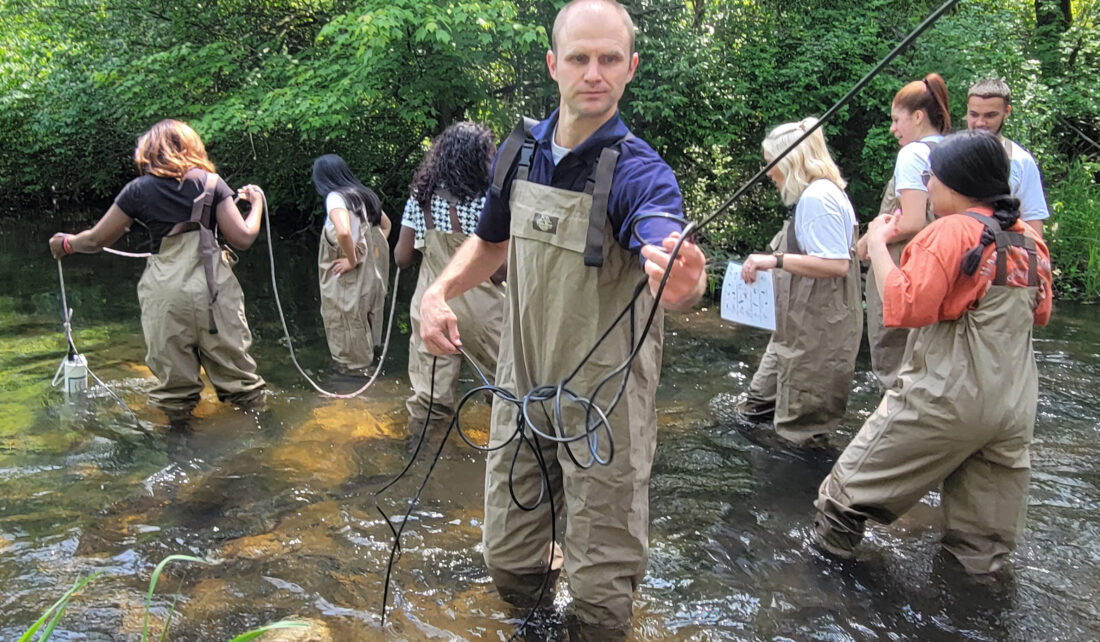
For a while now, John Gensic, a high school biology teacher in Mishawaka, Indiana, has been redirecting his teaching from a focus on classroom lectures to having students participate and be actively engaged as scientists. One key way he is achieving that is by putting a Hydrolab in his students’ hands.
Hydrolabs are sensor units that are used by scientists to monitor water quality and have been available for educators to borrow through Illinois-Indiana Sea Grant and the Environmental Protection Agency’s Limno Loan program since 2011. So far, 83 educators, many coming back for multiple years, have engaged nearly 13,800 students in collecting and analyzing data from nearby lakes, creeks, and rivers.
As a result, many of these educators have reported more time spent with their students on aquatic sciences— up to 2.5 weeks. They also report that students are more engaged because the data is relevant and real to them, plus they are learning valuable skills and feeling like real scientists.
In an example of an empowered young scientist, a Crown Point, Indiana high school student’s experience and initiative with a Hydrolab led her to an independent study project. When she graduated to Purdue University, the student brought this project with her; with help from her high school biology teacher, Ashley Cosme, the student developed and presented a poster about this project at the Hoosier Science and Engineering Fair and wrote an article that was published in Purdue’s undergraduate research journal.
Many educators who borrow a Hydrolab were introduced to the equipment while participating in the Shipboard Science Workshop, where educators spend a week on one of the Great Lakes working side by side with scientists, helping with research projects aboard the Environmental Protection Agency research vessel, the Lake Guardian.
Gensic (pictured along with his students on the following page) has taken part in the Limno Loan program since 2015 after his experience with the Lake Michigan teacher workshop, and his students now have years of data from the nearby St. Joseph River. In 2022, however, he stopped borrowing the equipment because he secured grant funding to buy a Hydrolab for Penn High School.
“Because we have our own Hydrolab, we are not limited to the loan period and whatever weather or circumstance that happens during that two-week time,” said Gensic. “It’s been a great catalyst to do a variety of fieldwork. I’m able to take my students out more frequently and other science teachers can do the same. The number of students who have been impacted by the increased access is probably fivefold from what it was before.”
In fact, in 2022, Gensic’s 100 biology students used the Hydrolab to monitor the St. Joseph River as many as 14 times. Four other science teachers used the Hydrolab to connect approximately 475 more students to real-world assignments.
Gensic attributes the shipboard workshop and the Hydrolab as re-energizing his career as a teacher, helping him continue to learn and grow and fully engage his students. And when his students get out in the field to monitor local waters, “they can get a deeper sense of where they’re at in our watershed, a deeper sense of the connection between what they’re learning in class and what’s just outside the door of our school, and they get a fun day outside,” he said.
Illinois-Indiana Sea Grant is a partnership between NOAA, University of Illinois Extension, and Purdue University Forestry and Natural Resources, bringing science together with communities for solutions that work. Sea Grant is a network of 34 science, education and outreach programs located in every coastal and Great Lakes state, Lake Champlain, Puerto Rico and Guam.

